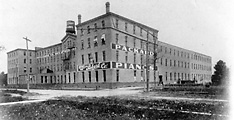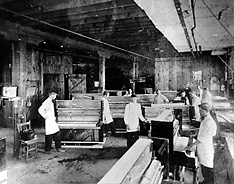CITYSCAPES
Playing our song
By KEVIN LEININGER
from the archives of The News-Sentinel
 |
The Great Chicago Fire may have been the best thing that ever happened to Fort Wayne music lovers.
That may sound strange, but consider this: one of the people who lost everything when the blaze leveled the Windy City on Oct. 9, 1871, was organ-maker Isaac T. Packard.
Legend has it that Packard boarded the next train east and told the
conductor to let him off when his money ran out. Packard got as far as Fort
Wayne, where he started the Fort Wayne Organ Co. on Nov. 20 1871. The Fort
Wayne Organ Co. in 1899 changed its name to the Packard Piano Co., which,
judging by the number of inquiries received by the Allen County Library, may
just be Fort Wayne' most fondly remembered industry of them all.
 |
The Fort Wayne Organ Co. set up shop on Fairfield Avenue and began
manufacturing ``organs which are the most beautiful, attractive and simple in
construction of any organ ever offered,'' according to a story in the Fort
Wayne Gazette in March 1881. The newspaper reported that the locally built
instruments possess a clear, brilliant and sweet tone and were especially
popular among missionaries.
So popular were the Packard-built reed organs that England's Queen Victoria
supposedly purchased one.
Unfortunately for Packard, there were not that many queens or missionaries
around. The company saw that pianos would be a more salable item and began
making them in 1893. The name-change followed six years later.
The company became quite successful, hitting its high note in the 1920s. At
its peak, the Packard Piano Co. employed more than 300 people at its Fairfield
plant.
Then the boom of the 1920s turned into the Depression of the 1930s, and the
Packard Piano Co. fell on hard times. The last piano rolled out of the Packard
plant on Feb. 6, 1930. The Packard trademark was used by other manufacturers,
but the instrument was never again made in Fort Wayne.
Packard Piano Co. was noteworthy in that it was one of the first factories
to institute labor reform. Under its ``industrial Democracy'' program,
workdays were shortened to eight hours, working conditions were improved and
employees were given better pay for fewer hours of work. The result was an
instrument still prized by owners of a brand once respected nationwide but
based in Fort Wayne.
The Packard Piano factory was torn down in the early 1930s. The city park
department purchased the land in 1937 and today Packard Park stands where Fort
Wayne's most musical industry once stood.
--Nov. 21, 1981

